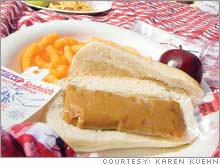|
Space-age sandwich
A startup's technology extends the lifespan of an unrefrigerated sandwich by as much as a month.
NEW YORK (FORTUNE Small Business Magazine) - Thanks to Diana's Homegrown, a startup in tiny Lemitar, N.M. (pop. 200), you may soon have to consult an instruction manual before biting into your lunchtime sandwich. The company's patented Pull Out Pouch System is designed to transform the tuna-salad sandwich from an easily spoiled, soggy mess into a fresh and long-lasting meal. The technology extends the lifespan of an unrefrigerated sandwich by as much as a month -- even longer if it is stowed in the fridge. Later this year Native American senior citizens in northern New Mexico will be chowing down on the fare. And that's just a start. Target, the giant retailer, has tested the product in 16 stores. While Diana's Homegrown (www.sandia.gov/supplier/docs/ DHomegrownEOB.pdf) has yet to make a profit, founder and president Reggie Alsbrook, 55, expects sales to rise from $150,000 in 2005 to $4.2 million this year -- or 108 truckloads of the stuff.
What makes the sandwich distinct from other pre-made fare is this: The filling stays away from the bread, in a polymer pouch. That pouch is hermetically sealed and placed inside a hand-cut trench in a French roll. Keeping the filling and the bread separated prevents bacterial invaders from spoiling the ingredients and the bread from absorbing liquid. Diana's Homegrown wraps and seals the sandwich in a plastic baggie with a red tab poking out of the top. When the day comes for devouring, the hungry user tugs that rip cord, which deploys the sandwich filling onto the bread. In 2004, after appearing at a Sandia National Labs Supplier Showcase -- beside biotech, optics, and other high-technology companies -- Diana's was approved as an official Sandia caterer. Tressa Gaskin, who plans meetings for Sandia, says the sandwich "felt Space Age and tasted absolutely delicious. We all tried to figure out how they got that pouch to work." Credit for the breakthrough belongs to William Noel Alsbrook, Reggie's father, a TV technician who spent a decade working on a way to rid the world of soggy sandwiches. He got a patent in 1998, just three weeks before he died at age 81. Honoring a request from his father, Reggie worked with a team from New Mexico State University to create a viable product. "We ran all types of stuff through it," recalls Linda Riley, a professor of engineering. These days 15 employees manually produce more than 15,000 sandwiches, which wholesale for $2.25 apiece, in 24 hours. Within a few months, Alsbrook expects to raise money to buy a sandwich-assembly machine that will cut costs -- and extend the lifespan of lunches everywhere.
Next innovation: Beyond the iPod?
|
| ||||||||||||||||||||||||

